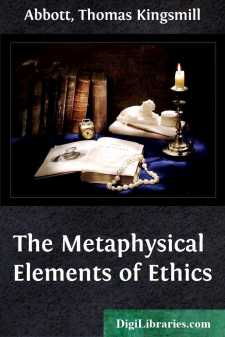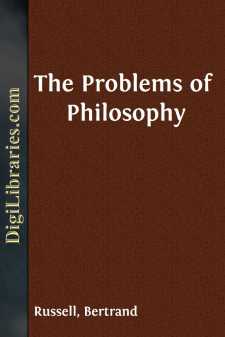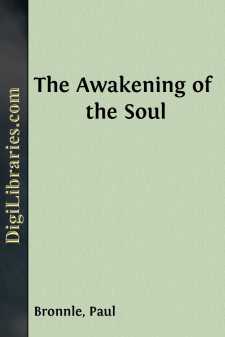Categories
- Antiques & Collectibles 13
- Architecture 36
- Art 48
- Bibles 22
- Biography & Autobiography 813
- Body, Mind & Spirit 142
- Business & Economics 28
- Children's Books 17
- Children's Fiction 14
- Computers 4
- Cooking 94
- Crafts & Hobbies 4
- Drama 346
- Education 46
- Family & Relationships 57
- Fiction 11829
- Games 19
- Gardening 17
- Health & Fitness 34
- History 1377
- House & Home 1
- Humor 147
- Juvenile Fiction 1873
- Juvenile Nonfiction 202
- Language Arts & Disciplines 88
- Law 16
- Literary Collections 686
- Literary Criticism 179
- Mathematics 13
- Medical 41
- Music 40
- Nature 179
- Non-Classifiable 1768
- Performing Arts 7
- Periodicals 1453
- Philosophy 64
- Photography 2
- Poetry 896
- Political Science 203
- Psychology 42
- Reference 154
- Religion 513
- Science 126
- Self-Help 84
- Social Science 81
- Sports & Recreation 34
- Study Aids 3
- Technology & Engineering 59
- Transportation 23
- Travel 463
- True Crime 29
The Metaphysical Elements of Ethics
Categories:
Description:
Excerpt
If there exists on any subject a philosophy (that is, a system of rational knowledge based on concepts), then there must also be for this philosophy a system of pure rational concepts, independent of any condition of intuition, in other words, a metaphysic. It may be asked whether metaphysical elements are required also for every practical philosophy, which is the doctrine of duties, and therefore also for Ethics, in order to be able to present it as a true science (systematically), not merely as an aggregate of separate doctrines (fragmentarily). As regards pure jurisprudence, no one will question this requirement; for it concerns only what is formal in the elective will, which has to be limited in its external relations according to laws of freedom; without regarding any end which is the matter of this will. Here, therefore, deontology is a mere scientific doctrine (doctrina scientiae). *
* One who is acquainted with practical philosophy is not, therefore, a practical philosopher. The latter is he who makes the rational end the principle of his actions, while at the same time he joins with this the necessary knowledge which, as it aims at action, must not be spun out into the most subtile threads of metaphysic, unless a legal duty is in question; in which case meum and tuum must be accurately determined in the balance of justice, on the principle of equality of action and action, which requires something like mathematical proportion, but not in the case of a mere ethical duty. For in this case the question is not only to know what it is a duty to do (a thing which on account of the ends that all men naturally have can be easily decided), but the chief point is the inner principle of the will namely that the consciousness of this duty be also the spring of action, in order that we may be able to say of the man who joins to his knowledge this principle of wisdom that he is a practical philosopher.
Now in this philosophy (of ethics) it seems contrary to the idea of it that we should go back to metaphysical elements in order to make the notion of duty purified from everything empirical (from every feeling) a motive of action. For what sort of notion can we form of the mighty power and herculean strength which would be sufficient to overcome the vice-breeding inclinations, if Virtue is to borrow her "arms from the armoury of metaphysics," which is a matter of speculation that only few men can handle? Hence all ethical teaching in lecture rooms, pulpits, and popular books, when it is decked out with fragments of metaphysics, becomes ridiculous. But it is not, therefore, useless, much less ridiculous, to trace in metaphysics the first principles of ethics; for it is only as a philosopher that anyone can reach the first principles of this conception of duty, otherwise we could not look for either certainty or purity in the ethical teaching. To rely for this reason on a certain feeling which, on account of the effect expected from it, is called moral, may, perhaps, even satisfy the popular teacher, provided he desires as the criterion of a moral duty to consider the problem: "If everyone in every case made your maxim the universal law, how could this law be consistent with itself?" But if it were merely feeling that made it our duty to take this principle as a criterion, then this would not be dictated by reason, but only adopted instinctively and therefore blindly.
{PREFACE ^paragraph 5}
But in fact, whatever men imagine, no moral principle is based on any feeling, but such a principle is really nothing else than an obscurely conceived metaphysic which inheres in every man's reasoning faculty; as the teacher will easily find who tries to catechize his pupils in the Socratic method about the imperative of duty and its application to the moral judgement of his actions. The mode of stating it need not be always metaphysical, and the language need not necessarily be scholastic, unless the pupil is to be trained to be a philosopher....













